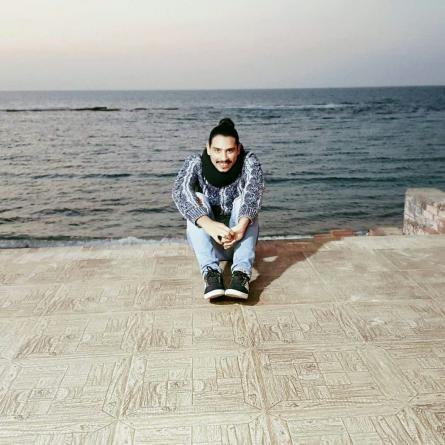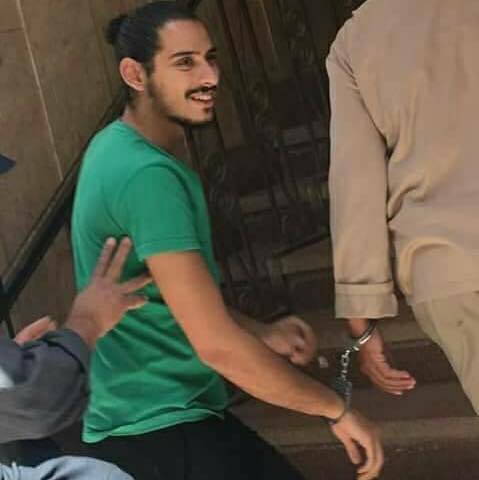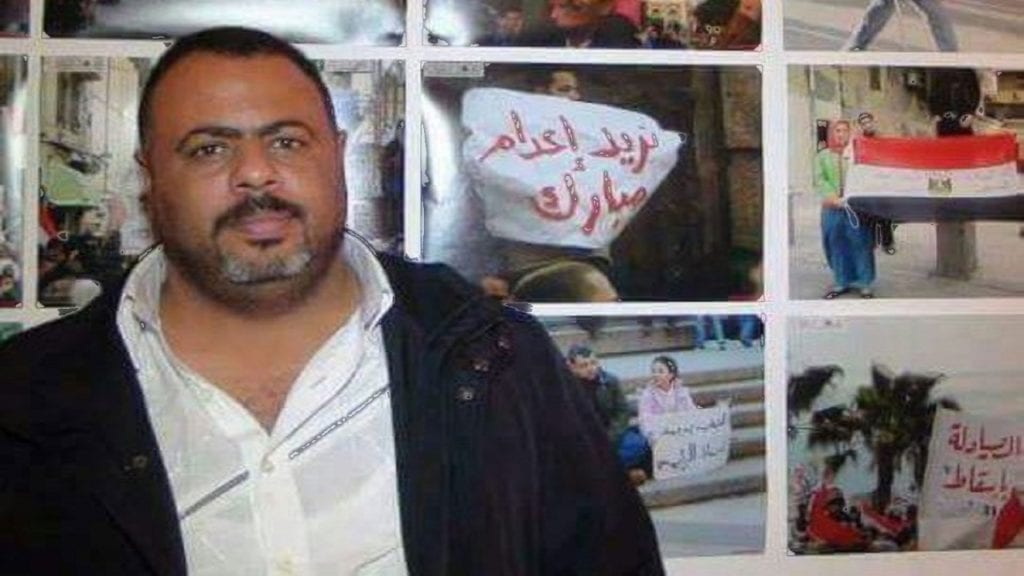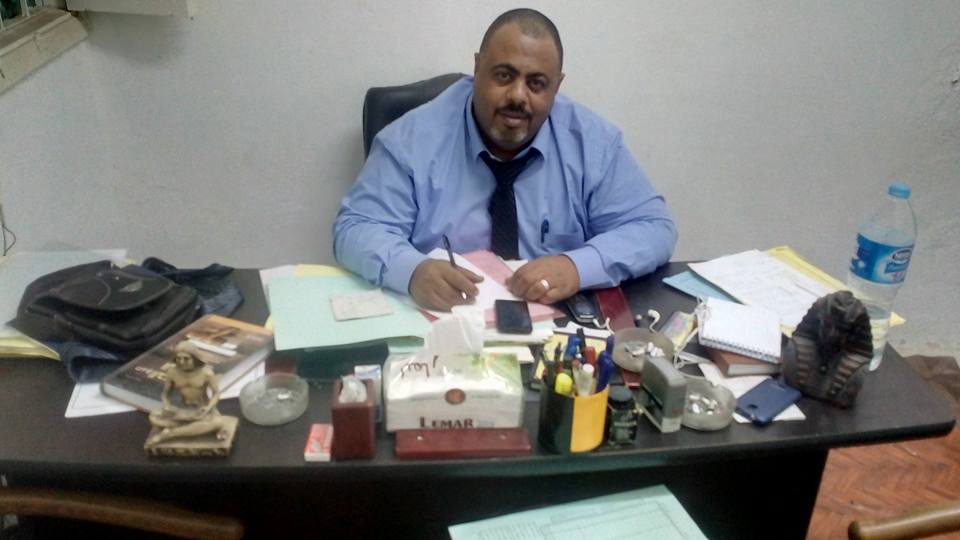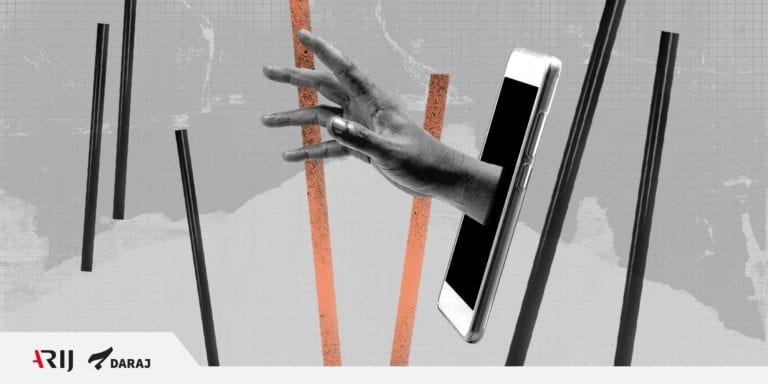Part One of Two.
Standing at the balcony of his house overlooking Arbaeen Square in Suez City, 30-year-old Mohamad Said took out his phone and switched on the live broadcast function on his personal Facebook account. He aimed the camera at the policemen and demonstrators below him, who had gathered there in response to a call by Spain-based actor and contractor Mohamad Ali.
Said’s attempt to document the demonstration in September 20, 2019, was reason for the security forces to enter his house within 48 hours. From that moment until the moment of completing this investigative report on February 1, 2021, Said has been imprisoned in Port Said, accused of joining a terrorist group and using a special Internet account with the aim of broadcasting and spreading fake news, which could disturb public security and cast terror in the hearts of citizens.
Said, who only wanted to document the demonstration, was hardly the only one who got arrested without participating in an actual demonstration. Numerous activists, politicians, journalists and university professors, as well as blogger and activist Alaa Abdel al-Fattah and his lawyer, Muhammad al-Baqer, who was arrested inside the Supreme State Security Prosecution building during Fattah’s interrogation, all shared Said’s fate.
The same is true Cairo University professors Hassan Nafaa and Hazem Hosni, former president of the Constitution Party Khaled Daoud, lawyer Mahienour Al-Masry, and hundreds of others, all of whom were arrested after their phones and Facebook accounts were searched. As part of a governmental campaign launched last September, nearly 4,000 people were targeted, according to the Egyptian Center for Economic and Social Rights (ECESR). Most were charged with “using a private Internet account to join a terrorist group or share its goals.”
Facebook is one of the most used social media platforms in Egypt. Over 40 million Egyptians have an account, according to the Crowd Analyzer 2019 State of Social Media Report.
Security forces targeting Facebook users, political and social activists or just ordinary citizens classified by the authorities as “opponents” has become a common phenomenon in recent years. People have been arrested and prosecuted for posting an opinion, photo or video, or even for just liking or sharing a Facebook post. Charges carry prison sentences of up to 10 years.
The authorities use the latest technologies enabling them to expand the circle of mass surveillance on the one hand, and extremely loosely worded laws on the other hand. In this investigation, we highlight five stories of ordinary citizens, whom the authorities labeled political opponents because of their Facebook posts. In the ensuing confrontation the government used an arsenal of laws to arrest and detain them and squash their constitutional right to freedom of expression, forcing most of them to eventually leave virtual reality altogether.
Andrew Nassif: The First Christian Terrorist
Amal Aziz Zaki (65) knocked on virtually every door of what she called “the big people whose word is heard,” hoping they could bring President Abdel Fattah El-Sisi to pardon her son, who had been sentenced to 5 years in prison.
Zaki knocked on doors from the moment the police stormed her home in the village of Banaios in the Nile Delta on May 16, 2017, to arrest her son Andrew Nassif until the moment the Zagazig Criminal Court on October 15 of that year sentenced him to 5 years imprisonment.
His crime? Promoting terrorism through the use of social media.
Hope made her endure the trouble of traveling 89 kilometers back and forth from Zagazig to Cairo, twice a week, to request the Presidential Pardon Committee, Council of Ministers, House of Representatives and Ministry of the Interior to deliver a message to President Sisi stating that “Andrew Nassif, a Christian student working in tourism to pay for his education, is accused of terrorism.”
She considered that phrase alone should be sufficient to release her son, as she believed the charges of incitement against the regime and insulting state institutions stemmed from a lack of knowledge of the fact that Andrew was exactly that: Christian.
Andrew is one of 28 young men across ten governorates who were arrested in May 2017, as part of a security campaign targeting alleged activists and members of political parties. This coincided with the approval of the controversial Tiran and Sanafir Islands Deal, which demarcated the maritime boundaries between Egypt and Saudi Arabia.
The 23-year-old had written on his Facebook page: “When will we drop prison and military dictatorship again?” And: “Ask for freedom and talk about every oppressed person in the country as if you know him, for one day, he may be you.”
Due to these posts, Andrew was sentenced to five years imprisonment, as the authorities judged it a full-fledged terrorist crime, based on the Anti-Terrorism Law issued in August 2015, just days after the assassination of Attorney General Hisham Barakat. The law’s main aim was to target members of the Muslim Brotherhood and militant groups.


A Very Secret Investigation
The Zagazig Criminal Court based its sentence to imprison Andrew for five years on what it called a “secret investigation” by a National Security Officer, which concluded the accused was one of the main elements inciting violence, insulting state institutions, calling for citizens to demonstrate, organizing protests and inciting riots. This all in an effort to obstruct the state’s plans for development and economic advancement of the country.
The charges included that Andrew was “promoting such ideas through websites with the aim of conveying false messages and false convictions in order to incite public opinion against the existing system.”
In addition, he was accused of “possessing and editing publications calling for incitement against the regime, and bringing down state institutions, including the army, the police and the judiciary.”
The National Security Officer presented the allegations in a report to the Public Prosecution Office, which authorized him to arrest Andrew and search his residence on May 16, 2017, at three in the morning.
According to the court documents, the search of Andrew’s residence found “eight publications with the phrase Wake Up and Return, four entitled Our Hunger, six publications on the January 25 revolution, and five on the April 6 Youth Movement. This in addition to a banner with the text: “I’m April, the Voice of Truth.”
Andrew’s mother, however, has stated that the police only took her son, his phone and his ID from her home, denying they found any leaflets. And although the court touched upon Andrew’s denial of possessing any leaflets, it confirmed the investigation conducted by the National Security officer and his confidential sources, while not including the seized documents in the case file.
The court ruling states: “It is the defense’s responsibility to let the officer testify alone and to separate the rest of the testimonies of the men accompanying him from his. Therefore the officer’s behavior in not giving the names of the members of the accompanying force does not affect the integrity of his statements and their sufficiency as evidence in the case. When the court is satisfied with the statements of an officer who witnessed the evidence, accepts it, and is comfortable with it, the defense’s denial in this regard is not valid, and we must reject it.
Andrew’s lawyer Abdel Aziz Youssef explained that, according to the court, the National Security Officer collected information on Andrew, arrested him and testified against him. As for the publications found in his home, the court acted as if they were totally absent, even though the police officers had arrested him based on them. Even the police offers who participated in the arrest of Andrew did not testify to Andrew’s possession of those publications.
The Presidential Pardon Before the Court of Cassation heard the appeal filed by the Andrew family, President Sisi on May 16, 2018, pardoned 332 young prisoners and prisoners with health conditions, including Andrew, his colleague, who had been arrested hours before him, and Islam Mara, the Secretary of the Egyptian Democratic Party, who had been sentenced to three years imprisonment.
Andrew was released from prison after a full year behind bars. He closed his Facebook account for 16 months, before reopening it again in September 2018 to post personal photos. We tried to talk to him after he reopened his account. We actually set more than one date for the interview, the last of which in March 2020, but he apologized and said he preferred not to remember the prison experience ever again.
Mohamad Ramadan: First Ban on Using the Internet
On December 1, 2016, lawyer Muhammad Ramadan published several posts on his personal Facebook page, including “Tiran and Sanafir Masriya” and “Awad sold his land,” both referring to agreement to transfer two Red Sea islands to Saudi Arabia.
Following a fellow lawyer’s complaint accusing Ramadan of publishing posts violating the rights of the president and inciting against the regime, security forces on December 5 arrested him while working in Alexandria’s Montaza area.
The public prosecutor investigated Ramadan and released him, after detaining him for 48 hours, on a bail of 10,000 pounds ($637). On April 12, 2017, however, the Alexandria Criminal Court (ACC) sentenced him in absentia to ten years in prison and banned him from using the Internet for five years.
The court considered his Facebook posts an insult to the president and an incitement to terrorism. This was the first ever application of Article 37 of the Anti-Terrorism Law, which allows the court to oblige the accused to perform a certain act for a maximum of 5 years in addition to a prison sentence.
As the verdict was delivered in absentia, Ramadan submitted a request for a retrial to exempt him from carrying out the punishment. On June 10, 2017, the Supreme Constitutional Court suspended his trial until the constitutionality of a number of articles in the Anti-Terrorism Law had been decided upon.
The suspension allowed me to meet with Ramadan on October 28, 2017, before he was arrested again in another case.
“The nature of my work as a lawyer dealing with political issues, especially issues of freedom, causes a direct confrontation between me and the security services, especially National Security,” said Ramadan, explaining that he often submits complaints against officers accused of torture. Days before his arrest, National Security Officers had been asked people in the area where he lives about his relationship with the “Revolutionary Socialists.”
Ramadan immediately warned the Director of the National Security Sector in Alexandria, informing him that he works as a lawyer in political cases, and that he had noticed that the national security agents were arresting people, asking them Ramadan’s position within the “Revolutionary Socialists.”
Ramadan said he had no information about the movement, did not even know such a movement existed, and stressed that any charges against him were based on fabricated malicious reports. Days after his warning, security forces stormed his house in Alexandria. Ramadan, however, was in Cairo at that point. The security officers then arrested his mother and sister until he turned himself in. After an intervention by his family and lawyer, all three were released.
A few days later, however, security forces once again arrested Ramadan while he was defending one of his clients. Reason? There was a lawyer’s complaint filed against him based on what he posted on Facebook.
“I closed my Facebook account after the court sentenced me to ten years in prison,” Ramadan said. “If I had known I would be imprisoned for it, I would have written an educational article for people to understand it was just an opinion.”
Yet Ramadan’s decision to stay away from Facebook did not last more than six months. He created a new account in June 2018, which promptly was the reason for his re-arrest on December 11, 2018. This time he had posted a picture of him wearing a yellow jacket – a reference to the yellow jackets demonstrations in France – which the authorities considered an incitement to demonstrate.
For two years Ramadan was held in pretrial detention, before the Alexandria court on December 2, 2020, decided to release him on a bail of 5,000 pounds ($318). The court’s decision, however, was never implemented, as the prosecution on December 8, 2020 decided to detain him in a new case, No. 467, accusing him of “sending letters from within prison with the aim to destabilize.”
According to the Egyptian Initiative for Personal Rights, this is the charge on which Ramadan is still being held in pretrial detention. Meanwhile, the Supreme Constitutional Court is still debating whether the Anti-Terrorism Law is in fact constitutional.
This report is part one of a two part series.
Rana Mamdouh is an Egyptian journalist working for independent website Mada Masr, who specializes in judicial and parliamentary affairs. She has worked for a series of Egyptian and Arab newspapers, including Al-Dustour, Al-Tahrir, Al-Maqal, Al-Akhbar and Al-Safeer Al-Arabi, and is a reporter for Russian news agency Russia Sigodnia.
Read Also:


